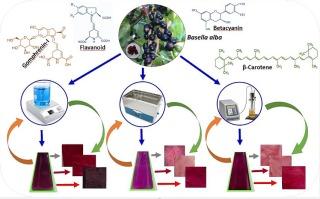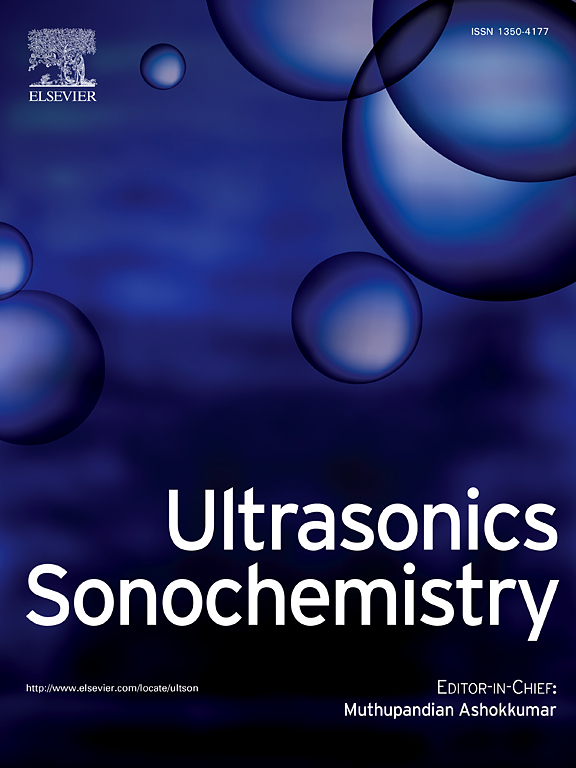棉花、丝绸和皮革用抗菌白苏果染料的可持续超声波提取
IF 8.7
1区 化学
Q1 ACOUSTICS
引用次数: 0
摘要
作为含有害化合物的合成染料的替代品,从天然资源中提取的染料因其更安全、更环保的特性而越来越受欢迎。本研究的重点是从巴沙拉果实中提取红色染料,并优化提取方法,包括超声波浴、超声波探头和直接加热。提取的染料可用于棉花、丝绸和皮革染色,无需媒染剂。此外,还评估了提取的红色染料对皮肤细菌的抗菌性能。紫外-可见分光光度分析表明,使用超声波水浴萃取法,在 60 °C 条件下 30 分钟,甲醇提取物中的红色达到最大值(λmax 270 和 λmax 542 nm),随后是超声波探针法和直接加热法。傅立叶变换红外光谱证实了提取的染料中含有黄酮类化合物、贝特矢车菊素和甘菊素-I。在不使用媒染剂的情况下,在 50 °C 下进行超声波染色,染色后的棉花、丝绸和皮革的 K/s 值为 6.3。此外,与其他染色技术相比,超声波染色法的匀染度为 0.5-1.5 级。在甲醇中提取后,提取的染料对所有假单胞菌都有明显的抗菌活性,其中对假单胞菌的抑制率最高,MIC 为 1.56 mg/ml。本文章由计算机程序翻译,如有差异,请以英文原文为准。

Sustainable ultrasonic extraction of antibacterial Basella alba fruit dye for cotton, silk, and leather
Alternative to synthetic dyes containing harmful compounds, dyes derived from natural sources are gaining popularity due to their safer and eco-friendly nature. This study focuses on extracting red dye from Basella alba fruit and optimising the extraction methods, including ultrasonic bath, ultrasonic probe, and direct heating. The extracted dye was then used for dyeing cotton, silk, and leather without needing a mordant. Furthermore, the antibacterial properties of the extracted red dye were evaluated against skin bacteria. The UV–Visible spectrophotometric analysis revealed that the maximum red colour in the methanol extract (λmax 270 and λmax 542 nm) was achieved at 60 °C for 30 min using the ultrasonic water bath extraction method, followed by the ultrasonic probe and direct heating methods. The FTIR spectra confirmed the presence of flavonoids, betacyanin, and gomphrenin-I in the extracted dye. The ultrasonic dyeing process at 50 °C yielded a K/s value 6.3 for the dyed cotton, silk, and leather without using a mordant. Additionally, the fatness test indicated a high grade of 0.5–1.5 for the ultrasonic dyeing method compared to other dyeing techniques. The extracted dye exhibited significant antibacterial activity against all Pseudomonas sp. after extraction in methanol, with the highest inhibition observed against Pseudomonas sp. with a MIC of 1.56 mg/ml.
求助全文
通过发布文献求助,成功后即可免费获取论文全文。
去求助
来源期刊

Ultrasonics Sonochemistry
化学-化学综合
CiteScore
15.80
自引率
11.90%
发文量
361
审稿时长
59 days
期刊介绍:
Ultrasonics Sonochemistry stands as a premier international journal dedicated to the publication of high-quality research articles primarily focusing on chemical reactions and reactors induced by ultrasonic waves, known as sonochemistry. Beyond chemical reactions, the journal also welcomes contributions related to cavitation-induced events and processing, including sonoluminescence, and the transformation of materials on chemical, physical, and biological levels.
Since its inception in 1994, Ultrasonics Sonochemistry has consistently maintained a top ranking in the "Acoustics" category, reflecting its esteemed reputation in the field. The journal publishes exceptional papers covering various areas of ultrasonics and sonochemistry. Its contributions are highly regarded by both academia and industry stakeholders, demonstrating its relevance and impact in advancing research and innovation.
 求助内容:
求助内容: 应助结果提醒方式:
应助结果提醒方式:


